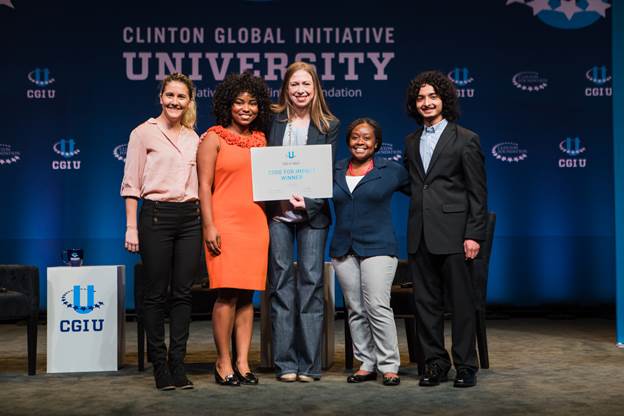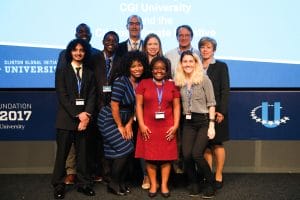Guest Post Written by Samarth Rawal
Samarth (Sam) Rawal is a senior studying Computer Science at Barrett, the Honors College at Arizona State University. As a student interested in applying his background in Computer Science to the healthcare field, Sam has been researching in a natural language processing lab for three years, where he is currently working on intelligently extracting important information from electronic medical records.
A few weeks ago, I had the opportunity to attend the Clinton Global Initiative University (CGI U) annual conference at Northeastern University in Boston. Created by President Bill Clinton in 2007, CGI U is a community of young students actively interested in — and working towards — global challenges in fields such as Public health, Climate Change, and Education. Every year, CGI U hosts a meeting where students, university representatives, and experts discuss solutions to these issues. This year, the conference featured speakers such as President Clinton, former Surgeon General Vivek Murthy, and former Secretary of State Madeleine Albright.
Students apply by forming a “commitment to action”, a plan designed to address a pressing challenge in a focus area of CGI U. As a computer science student interested in applying technology to healthcare, my commitment focuses on developing a low-cost tool for clinics in rural India that can utilize patients’ fingerprints as a reliable means for linking together medical records.
Photos from the Clinton Foundation Codeathon event.
The CGI U Conference also hosts a Codeathon, an event focused on designing digital prototypes that address a particular issue that begins a day prior to the conference. The focus for the 2017 Codeathon was improving energy efficiency in large metropolitan cities. My team prototyped an app called Wiser, an app aimed towards learning users’ shopping habits in order to provide customized shopping lists to minimize wasted food. Our team was able to win the subsequent idea-pitching competition and briefly meet Clinton Foundation Vice-Chair, Chelsea Clinton.
Personally, the most meaningful part of this experience was the opportunity to hear from and meet individuals so intensely focused on taking action to make a positive improvement in a particular area. From listening to Dr. Murthy speak about the problems and possible solutions surrounding the opioid crisis to speaking with fellow students who had developed their own companies that drove social change across the world, the determination and enthusiasm I was able to experience at the conference will continue to inspire me to push forward with my goals and ideas.





